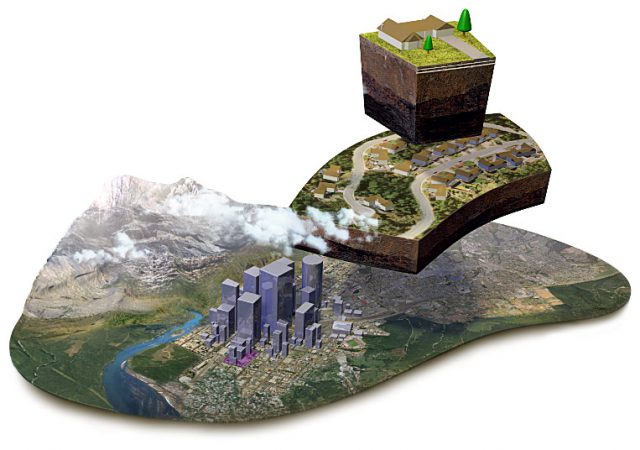A New Way of Thinking About
Municipal Infrastructure Has the Attention of the Local Government World
No longer is asset management only about hard engineered assets – watermains, sewers, roads. Watershed systems are also “infrastructure assets”.
Already facing a $200 billion challenge for renewal of hard infrastructure, Asset Management for Sustainable Service Delivery: A BC Framework provides a financial driver for local governments in British Columbia to integrate a whole-system, water balance approach and climate adaptation into asset management.
The BC Framework sets a strategic direction that would refocus business processes on outcomes that reduce life-cycle costs and risks. Use less water. Mimic natural flows in streams. Preserve the natural pathways by which water reaches streams. Slow, spread and absorb runoff. Benefits include less flooding, less stream erosion, more streamflow when needed most.

Water Balance Family of Tools + External Resources
Inter-governmental collaboration and funding enable the Partnership for Sustainability in British Columbia to collaborate with others to develop (and share) approaches, tools and resources; as well as provide teaching, training and mentoring.
The educational goal of the Partnership for Water Sustainability in British Columbia is to build practitioner capacity within the local government setting to implement a whole-system, water balance approach branded as Sustainable Watershed Systems, through Asset Management.
Comprehensive and coordinated use of the decision support tools and calculators listed below, which includes calculators developed by others (i.e. the bottom four), would help communities achieve this desired outcome.
TOOLS
Water Balance Model Desktop
Access to more QUALHYMO commands enables advanced problem-solving to establish watershed-specific water balance performance targets.
Water Balance Model Online
A planning tool for assessing green infrastructure effectiveness at neighbourhood or individual property scales. Compare scenarios for runoff reduction.
Water Balance Express
An interactive tool for homeowners. Click and drag components. Learn what it means and how to slow, spread and sink rainwater that runs off hard surfaces.
QUALHYMO Engine
Continuous and multi-year simulation modelling of hydrologic processes and water quality. Model has watershed, receiving stream and BMP components.
Drainage Infrastructure Screening Tool
Assess level-of-service for conveyance systems. Consider impact of both climate change and land use change at the same time, and with the same tool.
CALCULATORS
BC Water Conservation Calculator
Developed to support provincial grant applications, this tool is used by communities to demonstrate how fiscal and water savings would be achieved.
BC Agriculture Water Calculator
Developed to support the BC Groundwater Regulation, helps agriculture water users estimate annual irrigation or livestock water demands for farms.
Agricultural Irrigation Scheduling Calculator
Uses real time evapotranspiration data from climate stations to determine drip irrigation run times and sprinkler irrigation schedules for agriculture.
Landscape Irrigation Scheduling Calculator
Uses real time evapotranspiration data from climate stations across Canada to determine landscape irrigation system run times.
BC Landscape Calculator
Uses a provincial 500-metre gridded climate dataset to establish the allowable ‘water budget’ for outdoor water use for each and every property in BC.
Evapotranspiration Calculator
Obtains real time evapotranspiration data for climate stations across Canada. A crop’s water requirement or water usage is directly related to ET.
Everyone Learns from Stories!
The waterbucket.ca website celebrates and showcases
good work by those leading change.
Local Government Partners & Organizations
are excited about our Modeling Tools
“The Water Balance Express is an example of how science can be translated into a meaningful form to help inform non-scientists on how to contribute to positive change.”
— Julie Wilson, Academic Coordinator & Instructor, Master of Land & Water Systems Program, University of British Columbia“It’s great to see this proactive approach. I really like the ‘no nonsense, let’s get this problem solved attitude’. It’s very refreshing.”
— Peter McDonagh, Director of Design + Science, Kestrel Design Group (Minneapolis, Minnesota)